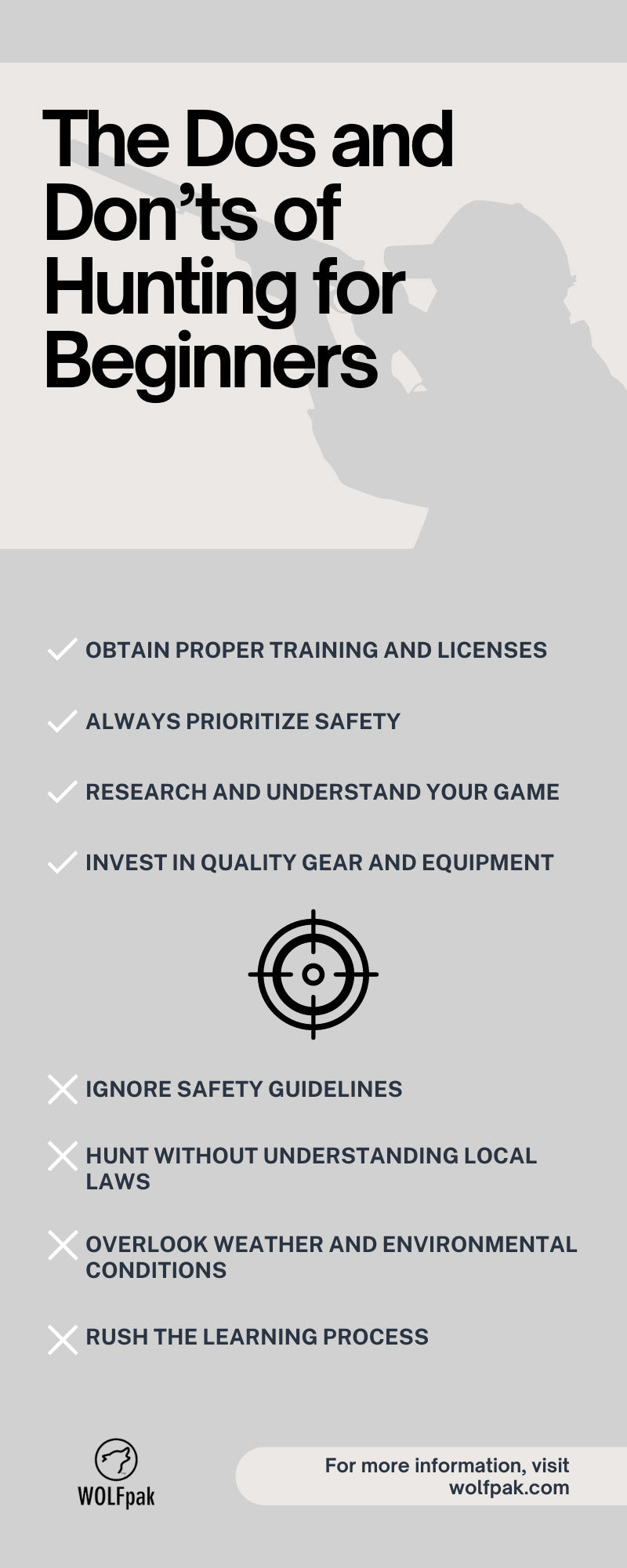Hunting is a practice deeply rooted in human experience, dating back to our most primitive ancestors. For beginners, stepping into the world of hunting can be both exhilarating and daunting. Whether you're drawn to hunting for wildlife management, tradition, or an appreciation for the great outdoors, proper hunting knowledge is critical to your safety and the integrity of the sport. This comprehensive guide will take you through the fundamental dos and don’ts of hunting for beginners.
Do: Obtain Proper Training and Licenses
Before you hit the woods, enrolling in a hunting safety and proficiency course is essential. Not only does it teach you the fundamentals of hunting and weapon safety, but it's usually a mandatory requirement for obtaining a hunting license in most states. Training will also give you hands-on experience so you can hone your skills before hunting on your own. Remember, knowledge is your greatest tool in the field.
Do: Always Prioritize Safety
Safety has no substitute. The golden rule in hunting is to treat every firearm as if it's loaded and never point a weapon at something you don't intend to kill. Beyond firearms, familiarity with first aid and survival techniques can be lifesaving. Carrying a first aid kit and understanding basic survival skills are smart moves in case of an unexpected turn of events. Above all, know your limits and respect the environment you're in.
Do: Research and Understand Your Game
Whether you are pursuing big game, waterfowl, or small game, understanding the habits and habitats of your quarry is key to a successful hunt. Behavioral patterns, diet, mating habits, and preferred territory are just a few things you should learn. This knowledge not only aids in tracking and bagging your game but also in developing an appreciation for wildlife and natural resources.
Do: Invest in Quality Gear and Equipment
Your success in the field often boils down to the gear you use. A high-quality rifle or bow is essential. However, don't overlook other items like clothing, boots, and scent control products that help you blend into the landscape and stay hidden from your prey. You’ll also want to purchase a high-quality tactical backpack to conveniently carry your belongings throughout the day. The investment in reliable and durable equipment is an investment in your ability to hunt safely and effectively.
Don’t: Ignore Safety Guidelines
Safety is instrumental when it comes to hunting. You should always be keenly aware of your surroundings, watching for other hunters, dangerous predators, and inclement weather conditions. If you’re hunting with a firearm, keep the barrel pointed away from yourself and other people. Additionally, unless you intend to fire the gun, always ensure the safety is on. Be mindful of clothing requirements, such as wearing blaze orange. Follow the fundamental safety rules and never dismiss them as trivial—they’re your shield of armor in the field.
Don’t: Hunt Without Understanding Local Laws
Ignorance of the law is no excuse. Familiarize yourself with hunting regulations specific to your area. This includes understanding the hunting seasons for different species, bag limits, legal hunting methods, and prohibited areas. Additionally, remember to keep your photo ID and hunting license on you during your hunt. Hunting without a proper license or violating hunting laws can lead to hefty fines, the loss of your hunting privileges, and even legal repercussions.
Don’t: Overlook Weather and Environmental Conditions
The environment can be as unforgiving as it is beautiful. Always check the weather forecast before you head out and prepare accordingly. This might mean dressing in layers, packing rain gear, or knowing the best course of action in case of a sudden change in conditions. Additionally, be mindful of forest fires, flooding, and other natural dangers.
Don’t: Rush the Learning Process
Hunting is a patient person’s game. Take your time and don’t expect to become an expert overnight. Practice shooting, learn to track, and understand the role of conservation in hunting. The more time you dedicate to learning and mastering the skills, the more successful and rewarding your hunts will be.
Crafting a Successful and Ethical Hunt
Hunting is about much more than merely tracking and taking down an animal. It's an opportunity for personal growth, a connection to our primal roots, and a chance to immerse ourselves in nature’s grandeur. Taking the right steps not only ensures the health and longevity of your hunting lifestyle but also contributes to the well-being of ecosystems, wildlife populations, and the hunting community.
Moreover, ethical hunting practices extend beyond identifying your target and shooting accurately. It means respecting the land and the animals you pursue. Always consider the sustainability of your actions—obey bag limits, use legal methods, and respect the rights of landowners. Perhaps most importantly, strive to become part of the conservation effort by contributing to wildlife management and habitat protection.
While hunting is inherently a test of skill, strength, and strategy, it also poses moral and ethical challenges. Each hunter should set personal values and boundaries that align with ethical considerations. The Fair Chase principle, for example, emphasizes giving the animal a fair opportunity to escape. Upholding ethical standards not only makes you a better hunter but adds depth and honor to the activity.
Upholding a Legacy of Responsible Hunting
Every hunter, particularly beginners, should continually seek to improve and adapt. The field is a place of learning, where each mistake can be a lesson for the next pursuit. By adhering to the dos and don’ts of hunting for beginners, you not only refine your own skills but uphold a legacy of responsible hunting for generations to come.
Hunting is a deeply personal experience that can foster a profound connection to nature and the cycle of life. With these tips, you’re better equipped to enter the woods with respect, enthusiasm, and the promise of adventure. Every outing is an opportunity to learn and grow, not just as a hunter but as a responsible steward of the wild. Be safe, be ethical, and above all, enjoy the privilege to hunt.
At WOLFpak, we specialize in durable gear you can use on a hunting adventure, a trip to the gym, or wherever else life takes you. A small tactical backpack is a great option when you’re looking for a compact but mighty hunting companion. This 25L backpack will hold all your gear with compartment pockets to keep you organized. Load tested up to 35 pounds per strap, it’s easy to carry your essential gear and equipment for an all-day hunt. With a variety of colors and patterns to choose from, investing in a tactical backpack from WOLFpak is the smart choice. Browse our selection to learn more!

Read more

The right gear can make or break any type of outdoor adventure. Check out the benefits of higher denier fabric and why it matters to outdoor enthusiasts.

For anyone who loves the great outdoors, selecting a durable, comfortable backpack is essential. Explore the top characteristics of a high-quality backpack.













Leave a comment
This site is protected by hCaptcha and the hCaptcha Privacy Policy and Terms of Service apply.